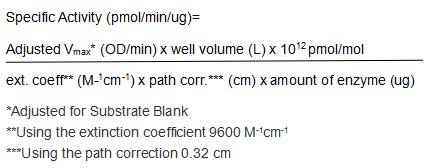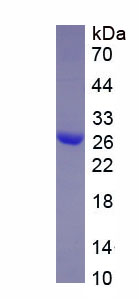Active Glutathione S Transferase Pi (GSTp)
GSTP1; GST-P1; DFN7; FAEES3; GST3
- Product No.APB090Ha01
- Organism SpeciesHamster (Chinese hamster) Same name, Different species.
- Buffer FormulationPBS, pH7.4, containing 0.01% SKL, 5% Trehalose.
- Traits Freeze-dried powder
- Purity> 90%
- Isoelectric Point7.9
- ApplicationsCell culture; Activity Assays.
- DownloadInstruction Manual
- UOM 10µg50µg 200µg 1mg 5mg
- FOB
US$ 236
US$ 590
US$ 1180
US$ 3540
US$ 8850
For more details, please contact local distributors!
ACTIVITY TEST

GSTp (Glutathione S-transferase P) is an enzyme that plays an important role in detoxification by catalyzing the conjugation of many hydrophobic and electrophilic compounds with reduced glutathione. GSTP1 is identified as a CDK5 (Cyclin dependent kinase-5) regulatory protein, and is thought to regulates negatively CDK5 activity via p25/p35 translocation. GSTP1 catalyze the endogenous glutathione conjugation 1-Chloro-2,4-dinitrobenzene (CDNB), which can increase in the absorbance at 340 nm. The reaction was performed in adding 10 μl 200 mM glutathione (reduced) and 10 μl 100 mM CDNB in 980 μl 100 mM NaH2PO4 (pH7.0), rapidly mixed. Then add 50 μl mixed substrates to 50 μl different concentrations of recombinant chinese hamster GSTP1, mix gentliy. Incubated at 37℃ for 5min, then read at a wavelength of 340 nm. The specific activity of recombinant chinese hamster GSTp1 is >6500 pmol/min/µg.
USAGE
Reconstitute in 10mM PBS (pH7.4) to a concentration of 0.1-1.0 mg/mL. Do not vortex.
STORAGE
Avoid repeated freeze/thaw cycles. Store at 2-8°C for one month. Aliquot and store at -80°C for 12 months.
STABILITY
The thermal stability is described by the loss rate. The loss rate was determined by accelerated thermal degradation test, that is, incubate the protein at 37°C for 48h, and no obvious degradation and precipitation were observed. The loss rate is less than 5% within the expiration date under appropriate storage condition.
GIVEAWAYS
INCREMENT SERVICES
-
 BCA Protein Quantification Kit
BCA Protein Quantification Kit
-
 Molecular Mass Marker for Protein
Molecular Mass Marker for Protein
-
 Monoclonal Antibody Customized Service
Monoclonal Antibody Customized Service
-
 Polyclonal Antibody Customized Service
Polyclonal Antibody Customized Service
-
 Protein Activity Test Experiment Service
Protein Activity Test Experiment Service
-
 Electrophoretic Mobility Shift Assay (EMSA) Experiment Service
Electrophoretic Mobility Shift Assay (EMSA) Experiment Service
-
 Buffer
Buffer
-
 Lentivirus Packaging Experiment Service
Lentivirus Packaging Experiment Service
-
 Adenovirus Packaging Experiment Service
Adenovirus Packaging Experiment Service
-
 Real Time PCR Experimental Service
Real Time PCR Experimental Service
-
 Spike RBD Protein (S-RBD)
Spike RBD Protein (S-RBD)
-
 Protein G
Protein G
-
 Protein A
Protein A
| Magazine | Citations |
| International Journal of Medical Sciences | Glutathione S-Transferase P1 Correlated with Oxidative Stress in Hepatocellular Carcinoma PubMed: PMC3619117 |
| Mol Neurobiol | Human Glutathione S-Transferase Enzyme Gene Polymorphisms and Their Association With Neurocysticercosis Pubmed:27021019 |
| Journal of Biomaterials and Tissue Engineering | 3D Printing of Differentiated Bone Marrow Mesenchymal Cells as a New Method for Liver Tissue Engineering art00007 |
| Neuroscience Bulletin | Comprehensive proteomic profiling of patients' tears identifies potential biomarkers for the traumatic vegetative state Pubmed:30019218 |
| Arabian Journal of Chemistry | Attenuating effect of Indole-3-Carbinol on gold nanoparticle induced hepatotoxicity in rats |
| International Journal of Nature and Life Sciences | The Role of Glutathione S-Transferases in Pleomorphic Adenomas of the Salivary Glands |
| Catalog No. | Related products for research use of Hamster (Chinese hamster) Organism species | Applications (RESEARCH USE ONLY!) |
| RPB090Ha01 | Recombinant Glutathione S Transferase Pi (GSTp) | Positive Control; Immunogen; SDS-PAGE; WB. |
| APB090Ha01 | Active Glutathione S Transferase Pi (GSTp) | Cell culture; Activity Assays. |
| PAB090Ha01 | Polyclonal Antibody to Glutathione S Transferase Pi (GSTp) | WB; IHC; ICC; IP. |
| MAB090Ha21 | Monoclonal Antibody to Glutathione S Transferase Pi (GSTp) | WB. |
| MAB090Ha22 | Monoclonal Antibody to Glutathione S Transferase Pi (GSTp) | WB; IHC; ICC; IP. |
| MAB090Ha23 | Monoclonal Antibody to Glutathione S Transferase Pi (GSTp) | WB; IHC; ICC; IP. |







